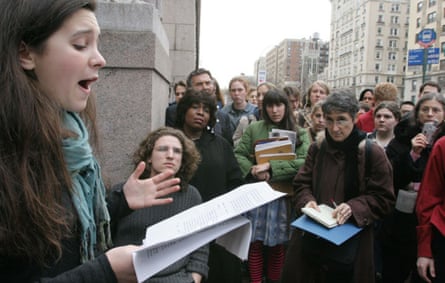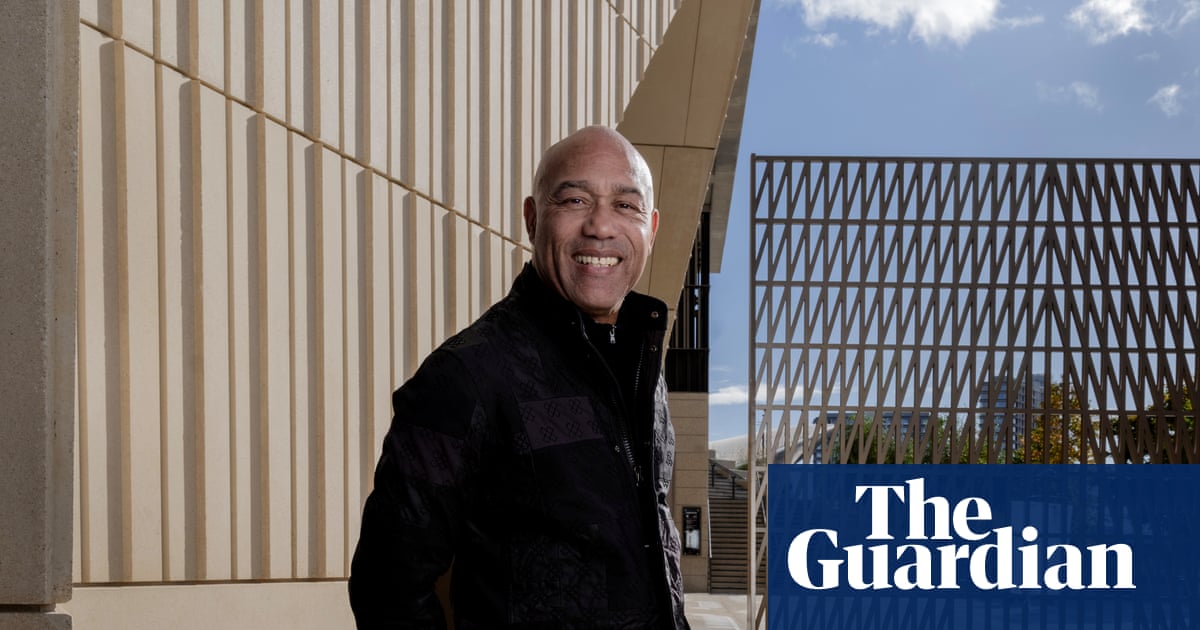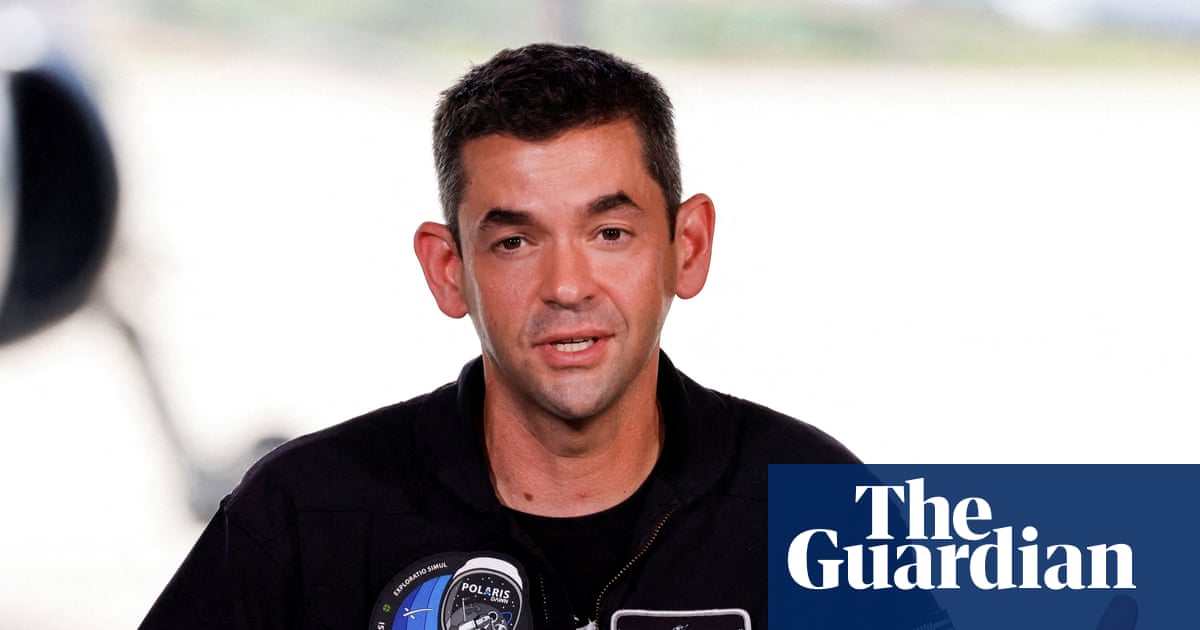After leaving the New York Times, she turned her Substack into a unshakeable pro-Israel voice. Now as Paramount eyes acquisition of her company, Weiss is poised to become Trump’s ally among media elites
Last month, federal regulators approved the long-anticipated merger of Skydance Media and Paramount Global, positioning David Ellison – the founder of Skydance and the son of megabillionaire Larry Ellison – as one of the most powerful figures in US media. Paramount Skydance Corporation, as it is now officially known, is one of a small handful of American media conglomerates, with Paramount Pictures, cable networks such as Comedy Central and MTV, and CBS all under its umbrella. CBS, in turn, runs one of the major US news operations, with nightly news viewership in the millions and 60 Minutes still being the most watched news program on network television.
The implications of the merger are far-reaching and were already being felt ahead of its final approval. In July, Paramount agreed to pay Donald Trump $16m to settle a lawsuit over a 60 Minutes segment the president disapproved of, and a few weeks later, CBS controversially cancelled The Late Show With Stephen Colbert, which many observers speculated was at least partly about jettisoning an outspoken critic of Trump in anticipation of the deal.
But one of the most buzzed-about aspects is Paramount’s possible acquisition of the Free Press, the digital media company founded by Bari Weiss as a Substack newsletter in 2021, and Weiss’s potential new role steering CBS’s editorial slant. In July, the Financial Times reported that Weiss was seeking at least $200m for her website – more than double its valuation a year earlier and more than the site’s admittedly impressive 155,000 paid subscribers (roughly a tenth of total subscribers) would seem to justify. That same week, the media newsletter Puck published an anonymously sourced report that Weiss would possibly be advising David Rhodes, a former CBS and Fox News executive and the current chair of Sky News, in the event that Rhodes resumes running CBS. And just last week, Puck reported that the deal was all but finalized, with the Free Press to be acquired for somewhere in the $100m to $200m range (less than Weiss sought but nothing to sneeze at) and with Weiss tasked with “guiding the editorial direction of the [CBS news] division”.
If all this comes to pass, it will cement Weiss as a key figure in shaping the national news environment, just five years after her much publicized resignation from the New York Times over what she characterized as a censorious and hostile workplace. This came in the wake of the resignation of editorial page editor James Bennet, after a staff uproar over the publication of Senator Tom Cotton’s opinion piece calling for military intervention against Black Lives Matter protesters.
Weiss, 41, is no stranger to publicity; since 2019, she has been the subject of mostly fawning profiles in Vanity Fair, Semafor, Los Angeles Magazine, the Times of London, the New Statesman, the Financial Times, and her former employers, the Wall Street Journal and the New York Times. The product of an idyllic and fiercely Zionist upbringing in Pittsburgh’s Jewish community, she first gained notice for her campaign against pro-Palestinian faculty during her undergrad years at Columbia University. A stint at the Bret Stephens-run neoconservative Wall Street Journal editorial page followed, before she and Stephens both departed for the New York Times, where her tenure as an opinion editor and writer was stormy well before her resignation. She and her wife, fellow voluntary Times exile Nellie Bowles, decamped to Los Angeles, where she wasted little time launching new projects: she co-founded the “heterodox” University of Austin and launched a Substack, originally dubbed Common Sense and then rebranded as the Free Press, which quickly acquired venture capital backers, a sizable subscriber base, and an editorial staff numbering in the dozens and including many media industry veterans. Her triumphant return to New York City last year marked her as a power broker in her own right. More than any other figure in her age cohort, Weiss wrote the playbook on canceling anti-Zionists and “woke” progressives, even as she decried “cancel culture” and claimed to champion free speech – and with the Free Press, she has developed a whole newsroom around that mission. The Guardian put detailed claims in this piece to Bari Weiss and the Free Press and did not receive an official response.

When New York Magazine convened 57 of “the most powerful people in media” to discuss the industry’s future last year, Weiss was on the list. A month later, after Trump’s victory, the Free Press co-hosted an inauguration party with Elon Musk’s X and Uber, attended by former British prime minister Liz Truss, Google co-founder Sergey Brin, and Dr Mehmet Oz. For each of her haters, and there are many, Weiss counts Jeff Bezos, Jerry Seinfeld (whose daughter is on staff at the Free Press), and Sheryl Sandberg among her fans, and Marc Andreessen, David Sacks, and Howard Schultz among her financial backers. “She doesn’t just speak to the 1%,” the conservative pollster Frank Luntz told the New York Times last year. “She speaks to the one-hundredth of 1%. And they’ll listen.”
In just a few years, Weiss has gone from a punchline in media circles to one of the most influential names in the industry, one with a genuine popular following beyond insiders and donors. Her stunning comeback is a tribute to her hustle, her oft-acknowledged personal charisma, and above all her unapologetic support for Israel and attacks on progressive social justice dogmas, often disparaged as “wokeness” – both of which align her with some of the most powerful people alive even as they alienate her from many of her generational peers in journalism.
But while Weiss is widely understood as a provocateur, what is less well understood is how she has used the Free Press to empower rightwing factions within established elite institutions, and how her efforts have been turbocharged by Trump’s return to the White House. If Weiss does join CBS, it will only formalize the role she has already carved out as the Trump administration’s de facto ally in its effort to silence progressive and pro-Palestinian voices. Weiss will be an ideological commissar situated within the highest levels of the media business, wielding her considerable platform to help the White House enforce compliance in spaces that fostered resistance during Trump’s first term: the media, academia and civil society.
To get a sense of the kind of opportunities Weiss might have to influence decisions and coverage at CBS, it is worth flashing back a year to the fall of 2024. On 30 September, Ta-Nehisi Coates appeared on CBS’s morning news show, where he was interviewed by anchor Tony Dokoupil over Coates’s new book, The Message, which includes a scathing firsthand account of Israel’s occupation of the West Bank. Dokoupil questioned Coates aggressively (some would say condescendingly) over what he called a one-sided depiction of Israel, and the interview was litigated on social media for days, pitting supporters of Israel and Palestine against each other on predictable lines.
A week later, the Free Press joined the fray with an exclusive from inside CBS News, where the Coates interview was at least as divisive as it was to the wider public. On the first anniversary of the 7 October Hamas attacks, someone high up at CBS leaked recordings of an editorial meeting to the Free Press, revealing that, as the site’s editors put it, “the network’s top brass all but apologized for the interview to staff, saying that it did not meet the company’s ‘editorial standards.’” Though the article acknowledged that CBS’s chief legal correspondent, Jan Crawford, defended Dokoupil’s tough questions, it portrayed the meeting overall as an example of the woke conformity endemic to institutions such as CBS.
“The sad truth is that Coates is not speaking truth to power,” the Free Press editorialized, in a sweeping indictment both of CBS and of elite liberalism writ large. “He is echoing the new consensus of the powerful. One can find more sophisticated versions of The Message in the course catalogs of Ivy League universities, the editorial pages of leading newspapers, and in the reports of well-funded NGOs. It is journalists like Tony Dokoupil who are an endangered species in legacy news organizations, which are wilting to the pressures of this new elite consensus.”
A month later, Trump won the presidential election. Since then, what the Free Press editors termed “this new elite consensus” has been under siege from the federal government, which has openly sought to purge anything it considers “wokeness” from universities, newspapers and NGOs, and in particular has sought to criminalize pro-Palestinian activism and criticism of Israel. Weiss, who has presented herself as a leading defender of free speech, has in effect leveraged her publication to help the government suppress it.
The Free Press’s involvement in the administration’s war on Columbia University, Weiss’s alma mater (and, full disclosure, mine; I socialized with Weiss as an undergraduate, though we have not spoken in years) has been a case in point. Trump’s joint task force to combat antisemitism chose the Free Press to break the news on 7 March that the administration was withholding $400m in federal grants to Columbia over the university’s alleged failure to combat antisemitism in the wake of the 7 October attacks – essentially the opening volley in Trump’s assault on elite higher education. Two weeks later, on 21 March, Columbia conceded to Trump’s blackmail, agreeing to place its Middle East studies department – which Weiss has been crusading against since she was an undergraduate two decades ago – under academic receivership. Just four days after that, the Free Press published a leaked transcript of a private Zoom call in which the university’s then president, Katrina Armstrong, told around 75 faculty members that she did not intend to comply with all of Trump’s demands, despite her public surrender. Three days later, Armstrong resigned – and according to the New York Times, a key reason why was that Trump’s antisemitism task force expressed concern over the transcript leaked to the Free Press.
Weiss’s publication, in short, was the preferred vehicle for conveying information from Columbia insiders who wanted to purge all criticism of Israel from the university to Trump administration officials who were using unprecedented financial pressure to help them do exactly that. Just as with CBS a year ago, Weiss and the Free Press were there to help reactionaries at elite institutions advance their internal turf wars – and unlike a year ago, those reactionaries can now count on the full weight of Trump’s authoritarian administration to back them up.
The same playbook can also be seen in the Free Press’s efforts to discredit National Public Radio, which from 1971 until this summer served as America’s major publicly supported broadcaster. Last April, the Free Press published an error-laden article by a disgruntled NPR business editor, Uri Berliner, who accused his employer of pervasive liberal bias and of betraying America’s trust. Berliner was predictably hired by the Free Press two months later, and within a year, he was being invited by House Republicans to testify against his former employer. In July of this year, Trump’s allies on Capitol Hill voted to defund NPR, and the Free Press published Berliner’s victory lap. The pattern is clear: if you work at a liberal institution and you want the Trump-controlled federal government to step in and discipline it, Bari Weiss is there to help.
These are the real stakes of Weiss potentially joining CBS. If Paramount’s acquisition of the Free Press goes through, Weiss will likely be in a position to recruit a network of snitches and rightwing thought police, both from within existing CBS staff and from her own publication, ensconced throughout one of the four largest US media conglomerates. CBS staffers are reportedly “apoplectic” at the news of her impending role, with some raising concerns about a “hall monitor” approach to coverage and others threatening to resign – resignations Ellison and Weiss might welcome, as it would give them an opportunity to start fresh. Weiss could be responsible for shaping coverage and enforcing her own orthodoxy, especially with regard to Israel and its critics – an issue around which Weiss has consistently provided cover for Benjamin Netanyahu’s genocidal government. This would represent a shift for CBS; Paramount’s outgoing chair, Shari Redstone, is an avowed supporter of Israel who has reportedly been outraged by 60 Minutes’s coverage since the 7 October attacks, and has openly expressed hope that the Trump administration could force CBS to clamp down on “anti-Israel bias”, which Weiss is ideally suited to facilitate.

Last month, the Free Press sparked widespread outrage by publishing an article by staffers Olivia Reingold and Tanya Lukyanova, who reported that the starving Palestinian children whose images appeared in multiple mainstream outlets were all suffering from pre-existing conditions such as cystic fibrosis or rickets – a clear attempt to bolster a narrative the publication has been pushing for months that widely reported famine conditions in Gaza are a hoax. Reingold and Lukyanova’s article drew condemnation from many quarters, including from the president of Refugees International, who pointed out that it is precisely children with such conditions who are most vulnerable in a famine. But the Free Press brushed off its critics and claimed credit for pushing CNN and the Washington Post to caveat their coverage in light of their reporting. “Journalistic outlets love to boast about ‘impact,’ and this story has had more than its share,” wrote the editors. As if to prove their point, Netanyahu himself posted a video of Reingold defending her work, with the caption: “Facts matter.” [The Guardian stands by the stories it published that included the image and says the photo did not act to deceive.]
One of the critics the Free Press singled out was Ben Rhodes, a former top adviser to Barack Obama, who, the Free Press noted, was once nicknamed “Hamas”, an epithet used by his Obama administration colleague Rahm Emanuel (who sat for a friendly interview with Weiss in July) for his willingness to criticize Israel. In an appearance on Pod Save the World – which is part of Crooked Media, the independent progressive podcasting network run by former Obama staffers – Rhodes called Reingold and Lukyanova’s reporting “sociopathic” and “grotesque”. “There’s something wrong with you, deeply, deeply fucked up,” he added. These would be harsh words coming from anyone, but Ben Rhodes is the brother of David Rhodes, who has been floated as CBS’s next executive and who reportedly would be working closely with Weiss. In Ben Rhodes’s 2018 memoir, The World as It Is, he acknowledged political differences with his brother while also saying they have always been close. That he would speak publicly with such undisguised contempt about Weiss’s media company in that context suggests serious alarm at the possible direction of CBS News.
Alarm is a justifiable reaction. Weiss has often been underestimated, but the success of the Free Press to date vindicates her seemingly limitless ambition. That is in spite of internal turmoil: in May, the media newsletter Breaker reported that the Free Press has seen a number of notable departures amid its rapid expansion and that staff had been skeptical of Weiss’s “chaotic” management style.
But in the context of Trump’s federally funded culture war, it is unclear any of that will matter. In order to avoid the president’s disfavor and present themselves as worthy of access, legacy media companies are desperate to tap into the audience and the relationships that Weiss has so effectively courted.
Although the Free Press did not respond on the record to the Guardian’s questions, a source within the Free Press defended the range of views the organization publishes and emphasized that it was not a partisan shop.
When Trump first ran for office, Weiss positioned herself as a “Never Trumper”, following the lead of her mentor Stephens and other prominent neoconservatives, and in 2017 she described the first Trump administration as “shambolic”. But this February, as Trump kicked off his second term, Weiss told Fox News’s Howard Kurtz that her stance on Trump had softened. “I’m the first to admit that I was a sufferer of what conservatives at the time would have called TDS, Trump Derangement Syndrome,” Weiss said, claiming she cried at her desk the first time Trump won. Now, she explained, she had come to appreciate Trump for two main reasons: first, she saw the left’s “overzealous, out-of-touch, hysterical reaction to him” as “extraordinarily authoritarian and totalitarian in its impulses”, and second, she approved of some of his actual policies, noting particularly his Israel-aligned moves in the Middle East.
The Free Press claims to be independent and non-partisan, and ahead of the 2024 election it canvassed its own staff and determined that it was equally divided between supporters of Trump, Kamala Harris and neither. But during Trump’s second term, the site has been noticeably sympathetic to the administration. As the UnPopulist has carefully documented, Weiss has made a choice in the Trump restoration era – rather than position the Free Press as a heterodox champion of “classical liberalism”, as it was initially presented during the Biden years, she has aligned herself with the White House’s priorities. The hiring of Batya Ungar-Sargon, a formerly left-leaning journalist turned fervent Maga pundit, this April was a clear signal of Weiss’s repositioning. This choice has alienated many of her former champions – for instance, Glenn Greenwald, who achieved a public rapprochement with Weiss in the early days of the Free Press (both Weiss and Greenwald have thrived and handsomely profited on Substack), has since excoriated her for consistently attacking the free speech rights of Israel critics. But it has also set her up well to ascend to even greater influence.
Weiss is not afraid to burn bridges, scandalize critics or be branded a hypocrite in pursuit of power. In that sense, she has something in common with the president who has done so much to enable her rise. But Trump could never operate in the kinds of spaces where Weiss has been able to flourish. With her education, experience and extensively cultivated networks, she is uniquely well-suited to champion the prerogatives of those in academia, media, publishing and similar sectors who feel threatened by progressive social movements. Liberal institutions produced Bari Weiss, and now at least one could be hers to remake.
-
David Klion is a columnist for the Nation, a contributing editor at Jewish Currents, and currently working on a book about the legacy of neoconservatism

 1 month ago
51
1 month ago
51

















































